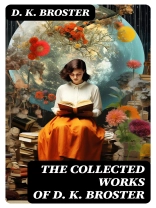The Collected Works of D. K. Broster is a meticulously curated anthology that showcases the literary prowess of Broster, an accomplished author whose works span various genres including historical fiction, ghost stories, and literary novels. Rich in atmospheric detail and psychological depth, this collection reflects the complexities of early 20th-century British society while seamlessly weaving elements of the supernatural into its narratives. Broster’s distinctive literary style is characterized by her meticulous prose and an evocative sense of place, drawing readers into intricately crafted worlds where tension between the known and unknown prevails. D. K. Broster (1877-1950) was influenced by the literary and historical currents of her time, as well as her personal experiences, including her travels across Europe and a keen interest in folklore. A member of the Bloomsbury Group, she was well-placed in a vibrant intellectual milieu, which likely inspired her to explore themes of identity, belief, and the intersection of history and myth. Broster’s enduring fascination with the supernatural shines through, revealing her as a pioneer of dark, immersive fiction that resonates even with contemporary audiences. The Collected Works of D. K. Broster is an essential acquisition for both scholars of early 20th-century literature and casual readers alike. This collection not only highlights Broster’s artistic versatility but also invites readers to appreciate the richness of her imagination. By engaging with Broster’s work, readers will discover a compelling exploration of human frailty and belief, making this anthology a rewarding journey through the shadows of history and the supernatural.
Über den Autor
Dorothy Kathleen Broster, commonly known as D. K. Broster (1877–1950), was a British author of historical novels, best known for her Jacobite-themed trilogy, which began with ‚The Flight of the Heron‘ (1925), followed by ‚The Gleam in the North‘ (1927), and concluded with ‚The Dark Mile‘ (1929). Broster’s works were highly regarded for their meticulous historical research and vivid storytelling, ensnaring readers with tales of heroism, adventure, and the tumultuous backdrop of Scottish history.
Born in Liverpool, Broster served as a Red Cross nurse during World War I, an experience that deeply influenced her subsequent writing. After the war, Broster shifted her focus to writing full-time, and her novels frequently charted the complexities and human dramas of historical events. Her body of work, compiled in ‚The Collected Works of D. K. Broster‘, provides a window into the past, brought to life through her skillful prose and engaging narratives. Though her novels are her chief legacy, Broster was also the author of short stories and non-fiction, including ‚Couching at the Door‘, a collection of supernatural tales, and ‚The Yellow Poppy‘, demonstrating her versatility as a writer.
Her literary style often incorporated elements of romance and action, while still reflecting the sober realities of the periods she depicted. Broster’s ability to create relatable characters caught in the sweep of history resonated with readers, securing her place in the annals of British literature.












